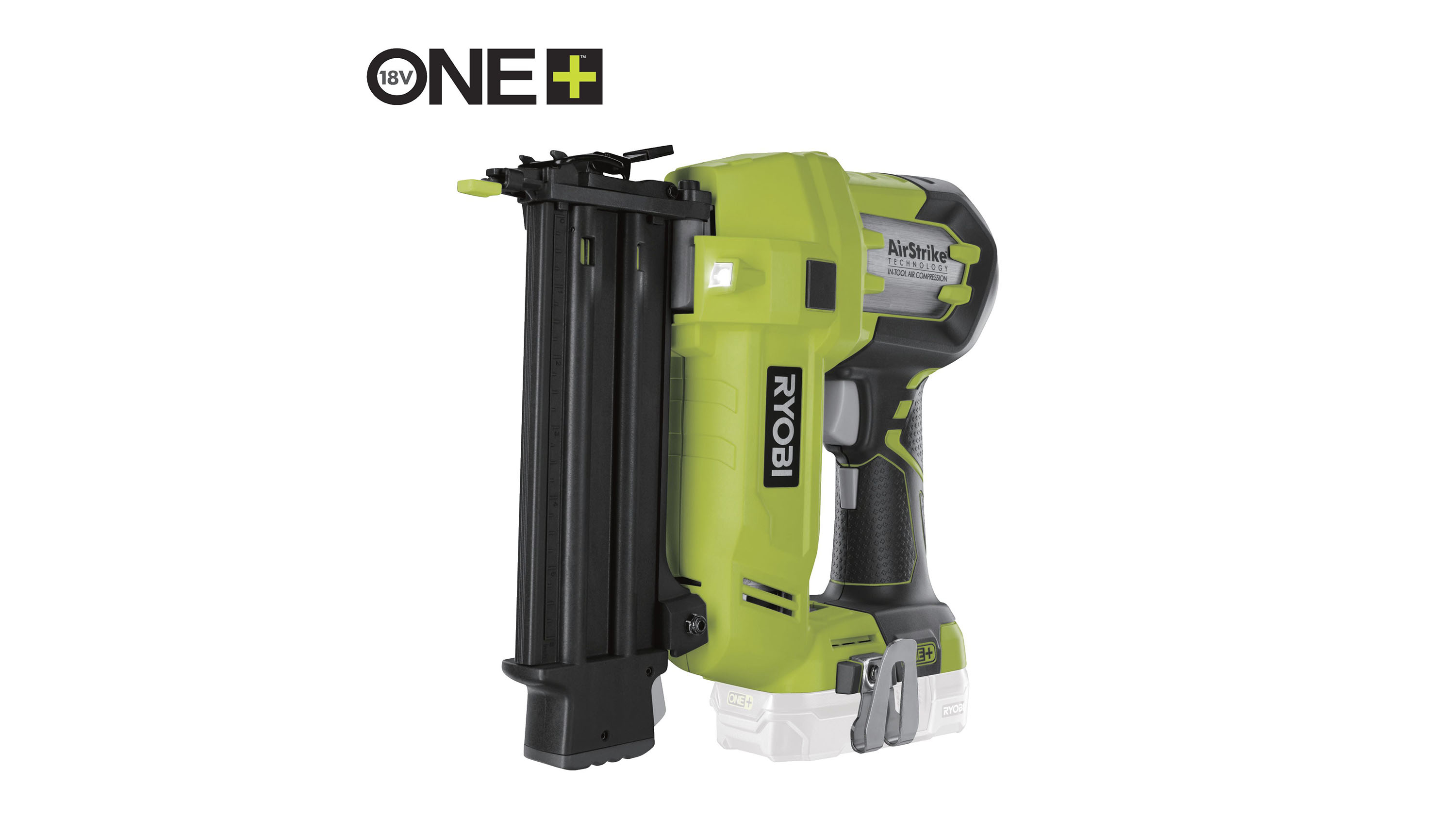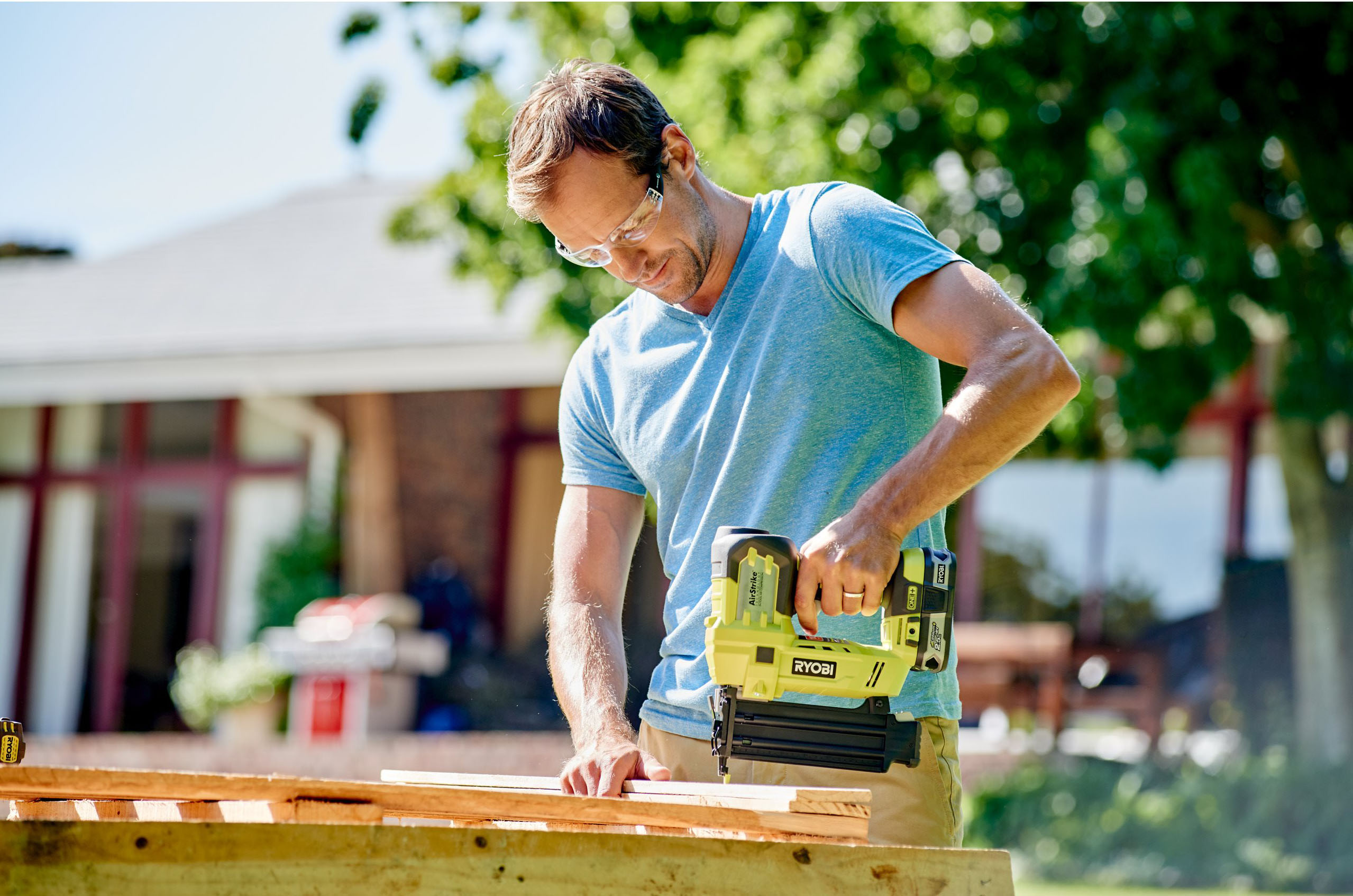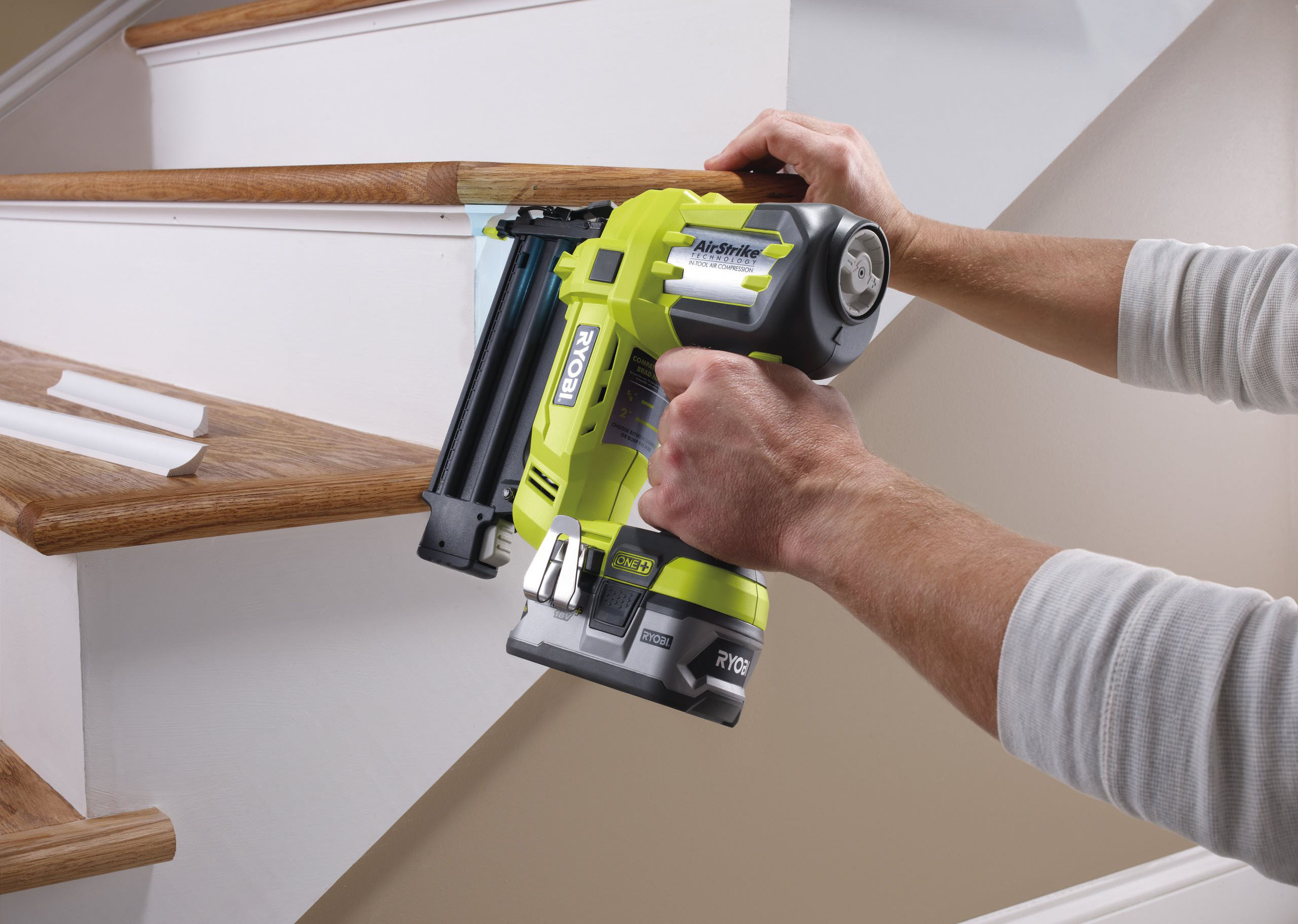For most DIYers, installing molding is the icing on a cake for any room. Trimming out windows, doors, or finishing rooms with baseboard, chair rail, and crown molding is a very rewarding project to take on. But even if the often-complex math of angles didn't scare you off, the thought of the bulky, loud compressor powering the nail gun might. Thankfully, the tools required to install molding are more homeowner-friendly these days.
Enter the Ryobi One+ 18 Volt Cordless AirStrike 18-Gauge Brad Nailer. It is at the more affordable end of the brad nailer market and designed for the finishing jobs mentioned before. We put it to the test against everyday DIY jobs to see how it performed so read on to find out. But first, we explain why you need a brad nailer in your kit and why they deserve a place in the list of the best power tools for home use.

Ryobi One+ 18 Volt Cordless AirStrike 18-Gauge Brad Nailer specifications:
- Gauge: 18
- Nail length: 5/8 to 2-inches long
- Run time: drives about 1,700 nails per charge
- Power: 18V 4Ah high capacity battery
- Weight: 6lb without battery
Who does the Ryobi One+ Cordless 18-Gauge Brad Nailer suit?
Before going into the particulars of this Ryobi nail gun, you first need to know why a cordless and compressor-free brad nailer is for you. It was only a few years ago that nail guns required either a compressor and a hose, or a gas fuel cell, to drive the gun's piston and set the nail. Both worked reliably, but they had drawbacks. Compressors are hefty and loud, and while the fuel cell-driven guns didn't need either, they had a smelly discharge and the inability to set nails rapid-fire.
But now nail guns rely on pure battery power, just like any other cordless tool. That means no smell, quieter operation, no need to drag around a hose or a compressor, and little maintenance. The tradeoff is these battery-powered nailers tend to weigh more, in part because of the battery, and they can be bulkier, which makes them harder to use in tight spaces.
Still, now is the best time to consider adding a nail gun to your arsenal because every major tool manufacturer is offering these fasteners on a pure battery platform. That means, regardless of what power tool battery brand you have, there is likely a suite of nail guns that use the same power pack as your circular saw. The convenience of power share means you can go cord free but still only need to port around one or two battery packs as you do jobs around the home.
A few years back, when battery-powered nail guns started coming out, they missed the mark. These first-generation tools were not reliable, bulky, and could never keep up with rapid-fire nailing. That’s no longer the case and with a renewed focus from the manufacturers on reliability, speed, and line of sight. Even many pros have started using battery-powered nailers because they're faster and easier than any other option. A DIYer will find an easier road to success using these nailers versus any traditional option.
Choosing a brad nailer or 18-gauge nail gun
Now that you know why you should consider battery-powered nailers, let's talk about which one. Look into the truck of any finish carpenter and you’ll see a range of nail guns, distinguished by the size of the fastener they fire. And while it can be confusing (and intimidating) to hear and read about all the various kinds of nailers out there, there are really only four styles that will handle any interior finish work.
From chunkiest nail to slightest, those are 15-gauge, 16-gauge, 18-gauge, and 23-gauge nailers. Thicker 15-gauge nails have better holding power for things like pre-hung doors, but they also leave a big hole that requires filling before painting or staining the trim or molding. On the other side of the spectrum, 23-gauge nailers, also called pin nailers, are what carpenters use to clamp pieces of wood together while the glue sets—the nail has no head, or a very slight one, that usually does not require any filling or sanding before finishing. Between 15, 16, and 18-gauge nailers there is a lot of overlap.
But the first one you should consider owning is the undisputed king: the 18-gauge nailer, often called a brad nailer. It's the workhorse tool that can do a variety of tasks like attaching casing to windows and doors, baseboard moldings, smaller stop moldings, and chair rails along with crown molding. The smaller hole a brad nailer leaves – about the size of a pen's tip – is less likely to split wood as you nail closer to the edge. Because of that, this style of nailer is also a very handy tool to have for woodworking projects. 18-gauge nailers fire nails between 3/8 to 2-inches long, depending on the brand. This Ryobi model fires 5/8 to 2-inch nails.

What is the Ryobi One+ 18 Volt Cordless AirStrike 18-Gauge Brad Nailer like to use?
So why this exact brad nailer? The Ryobi is the newest generation of battery-powered nailer that replaces a dated and slow fly-wheel design and instead drives the nail using the small compressor built into the tool. That compressor accounts for the tool's bulk. While there is some slight delay between when you pull the trigger and when the nail fires, it's a lot shorter than a fly-wheel design and faster than some gas fuel cell nailers – just not quite as immediate as a compressor.
Switching from nail length and material means tweaking the depth of the drive, which limits how deep or shallow the nail sits. Dialing in the right depth, in hardwoods like oak or softer material like pin, is easy using the chunky knob near the head. A dial in the back adjusts the air pressure, same as it would on a compressor, to help you adjust for different materials and thicknesses.
Additional features of the Ryobi One+ Cordless 18-Gauge Brad Nailer
There are a few details that make the Ryobi easier to use. The belt clip is handy to keep the tool nearby while working with both hands, though it is kind of bulky hanging off the hip. The work surface is illuminated by a pair of bright white LEDs mounted on the sides of the gun. This makes working in tight, dark spots much easier.
When you have only a few nails left in the gun, the dry-fire lockout feature kicks in. The nailer won't fire until you load in more brads, which prevents you from dinging the wood when you're out of nails. If a nail does jam – and they will, regardless of what kind of nailer you have – you can clear it tool-free by flicking a lever. The nails fire consistently and quickly regardless of the length and the material.
Is the Ryobi One+ 18 Volt Cordless AirStrike 18-Gauge Brad Nailer worth the money?
If you are a keen DIYer looking for an affordable, yet capable nail gun for a variety of jobs then you should definitely buy the Ryobi One+ 18 Volt Cordless AirStrike 18-Gauge Brad Nailer. Being part of a power share range, the tool only purchase is very affordable and you can buy batteries separately. These can then be used with a wide range of other tools in the Ryobi One+ range including the Ryobi One+ HP 18V cordless drill which we have reviewed and rated five stars. If you already have Ryobi One+ tools, it is a no brainer.
It also sits at the lower end of the price range for tools of this type and is less than half the price of similar models from brand leaders like Makita. Sure, the brad nailers aimed at pros are going to be better in many ways, but for the DIYer you can't go wrong with the Ryobi.
About this review and our reviewer
Sal Vaglica has been covering all aspects of home improvement for over 10 years, for publications like The Wall Street Journal, This Old House, and Men's Journal.
He tested the Ryobi 18-gauge nailer by firing nails into a variety of materials, like 3/4-inch thick pine, 1/2-inch thick oak, and 1/2-inch thick MDF to test for accuracy, reliability, and ease of use.
Join our newsletter
Get small space home decor ideas, celeb inspiration, DIY tips and more, straight to your inbox!
Sal Vaglica has been covering all aspects of home improvement for over 10 years, for publications like The Wall Street Journal, This Old House, and Men's Journal.
-
 Jennifer Garner's dining room is filled with “cohesive and intentional” features that showcase her personality
Jennifer Garner's dining room is filled with “cohesive and intentional” features that showcase her personalityDesigners love how the actor's space is rustic yet refined
By Eve Smallman Published
-
 Bobby Berk has revealed his favorite wall paint color — designers agree that it's a chic choice
Bobby Berk has revealed his favorite wall paint color — designers agree that it's a chic choiceThe Queer Eye star's choice of black is elegant and easy to decorate with
By Eve Smallman Published
-
 Vanessa Hudgens’ wallpaper puts a trendy twist on a classic style — designers love her effortless approach
Vanessa Hudgens’ wallpaper puts a trendy twist on a classic style — designers love her effortless approachThe actor's nature-inspired print is characterful and chic
By Eve Smallman Published
